
1. Unit 4
1.1. Vocabulary
1.1.1. Sports
1.1.1.1. Athletics
1.1.1.2. Boxing
1.1.1.3. Climbing
1.1.1.4. Cycling
1.1.1.5. Gymnastics
1.1.1.6. Ice Hockey
1.1.1.7. Ice Skating
1.1.1.8. Jogging
1.1.1.9. Rugby
1.1.1.10. Suash
1.1.1.11. Surfing
1.1.1.12. Swimming
1.1.1.13. Table Tennis
1.1.1.14. Tennis
1.1.1.15. Volleyball
1.1.1.16. Windsurfing
1.2. Grammar
1.2.1. Pasta Continuous
1.2.1.1. Positive
1.2.1.1.1. I, He, She, It + was + verb(-ing)
1.2.1.1.2. You, We, They + were + verb(-ing)
1.2.1.2. Negative
1.2.1.2.1. I, He, She, It + wasn’t + verb(-ing)
1.2.1.2.2. You, We, They + weren’t + verb(-ing)
1.2.1.3. Interrogative
1.2.1.3.1. Was + I, He, She, It + verb(-ing)?
1.2.1.3.2. Were + You, We, They + verb(-ing)?
2. unit 5
2.1. Vocabulary
2.1.1. Crimes and criminals
2.1.1.1. Bulgar - Bulgary
2.1.1.2. Hacker - Hacking
2.1.1.3. Picpocket - Pickpoketing
2.1.1.4. Shoplifter - Shoplifting
2.1.1.5. Theft - Thief
2.1.1.6. Vandal - Vandalism
2.1.1.7. Rob
2.1.1.8. Steal
2.1.2. Reflexibe Pronouns
2.1.2.1. Each other
2.1.2.2. Herself
2.1.2.3. Himself
2.1.2.4. Itself
2.1.2.5. Myself
2.1.2.6. Ourselves
2.1.2.7. Themselves
2.1.2.8. Yourself
2.1.2.9. Yourselves
2.2. Grammar
2.2.1. Past Continuos
2.2.1.1. We use the past continuous to talk about actions and events in progress at a particular time in the past.
2.2.2. Past simple
2.2.2.1. We use the past simple to talk about: • completed actions in the past, often with the time when they happened. • two or more actions which happened after one another.
2.2.2.2. We use the past simple and past continuous together when a shorter action in the past interrupted an action or event that was in progress.
3. Unit 6
3.1. Vocabulary
3.1.1. City Problems
3.1.1.1. Crowds
3.1.1.2. Graffiti
3.1.1.3. Green spaces
3.1.1.4. Pollution
3.1.1.5. Power cut
3.1.1.6. Public Transport
3.1.1.7. Rubbish
3.1.1.8. Rush hour
3.1.1.9. Traffic Jam
3.1.2. Compounds: Noun+Noun
3.1.2.1. Apartament Building
3.1.2.2. Bus Stop
3.1.2.3. Pedestrian Crossing
3.1.2.4. Post box
3.1.2.5. Red sing
3.1.2.6. Speed Limit
3.1.2.7. Taxi rank
3.1.2.8. Reciclyng bin
3.2. Grammar
3.2.1. Some/Any
3.2.1.1. * We use some and any with plural countable nouns and uncountable nouns. * We use some in positive sentences. We bought some petrol and some sweets at the garage. * We use any in questions and negative sentences.
3.2.2. A few/A little and a lot of
3.2.2.1. * We use these words to talk about large amounts. * We use a lot of with plural countable nouns and with uncountable nouns, in positive and negative sentences and questions. * We often use many with plural countable nouns in questions and negatives. * We often use much with uncountable nouns in negative sentences and questions.
3.2.3. Much/Many
3.2.3.1. * We use these words to talk about small amounts. * We use a few and a little in positive sentences and questions. We don't use these words in negative sentences. * We use a few with plural countable nouns. * We use a little with uncountable nouns.
4. Unit 1
4.1. Vocabulary
4.1.1. Hair
4.1.1.1. Blonde
4.1.1.2. Dark
4.1.1.3. Fair
4.1.1.4. Straight
4.1.1.5. Bald
4.1.1.6. Curly
4.1.2. Personality
4.1.2.1. Cheerful
4.1.2.2. Careless
4.1.2.3. Confident
4.1.2.4. Funny
4.1.2.5. Friendly
4.1.2.6. Miserable
4.1.2.7. Polite
4.1.2.8. Rude
4.1.2.9. Serious
4.1.2.10. Shy
4.1.3. Age
4.1.3.1. Elderly
4.1.3.2. In his/her...
4.1.3.3. Middle-aged
4.1.3.4. Teenage
4.1.4. Appareance
4.1.4.1. Attractive
4.1.4.2. Good-Looking
4.1.4.3. Handsome
4.1.4.4. Pretty
4.2. Grammar
4.2.1. Present simple
4.2.1.1. Positive
4.2.1.1.1. I, You, We, They + Verb(simple form)
4.2.1.1.2. She, He, It + Verb(+s, +es, + ies)
4.2.1.2. Negative
4.2.1.2.1. I, You, We, They + don´t + Verb(Simple form)
4.2.1.2.2. She, He, It + doesn´t + Verb(simple form)
4.2.1.3. Interrogative
4.2.1.3.1. Do + i, you, we, they + verb(simple form)?
4.2.1.3.2. Does + she, he , it + verb(simple form)?
4.2.2. Present continuous
4.2.2.1. Positive
4.2.2.1.1. I´m + verb(-ing)
4.2.2.1.2. You´re, they´re, we´re + verb(-ing)
4.2.2.1.3. She´s, he´s, it´s + verb(-ing)
4.2.2.2. Negative
4.2.2.2.1. I´m not+ verb(-ing)
4.2.2.2.2. You aren´t, they aren´t, we aren´t + verb(-ing)
4.2.2.2.3. She isn’t, He isn’t, It isn’t + verb(-ing)
4.2.2.3. Interrogative
4.2.2.3.1. Am + I + Verb(-ing)
4.2.2.3.2. Are + You, They, We + Verb(-ing)
4.2.2.3.3. Is+ He, She, It + Verb(-ing)
4.2.3. Prefixes
4.2.3.1. un
4.2.3.2. in
4.2.3.3. im
5. Unit 2
5.1. Vocabulary
5.1.1. Clothes: Adjetives
5.1.1.1. Badly dressed
5.1.1.2. Well-Dressed
5.1.1.3. Brand new
5.1.1.4. Casual
5.1.1.5. Comfortable
5.1.1.6. Loose-Fitting
5.1.1.7. Second-hand
5.1.1.8. Skinny
5.1.1.9. Smart
5.1.1.10. Trendy
5.1.1.11. Unfashionable
5.1.2. Adverbs
5.1.2.1. Amazingly
5.1.2.2. Badly
5.1.2.3. Carefully
5.1.2.4. Early
5.1.2.5. Fast
5.1.2.6. Heavily
5.1.2.7. Healthily
5.1.2.8. Lazily
5.1.2.9. Luckily
5.1.2.10. Politely
5.1.2.11. Quickly
5.1.2.12. Rudely
5.1.2.13. Seriously
5.1.2.14. Well
5.2. Grammar
5.2.1. Past simple
5.2.1.1. Positive
5.2.1.1.1. I, You, She, He, It, We, They + Verb(Past form)
5.2.1.2. Negative
5.2.1.2.1. I, You, She, He, It, We, They + Didn’t + Verb
5.2.1.3. Interrogative
5.2.1.3.1. Did + I, You, She, He, It, We, They + Verb?
6. Unit 3
6.1. Vocabulary
6.1.1. Life Events
6.1.1.1. Be born
6.1.1.2. Get a degree
6.1.1.3. Get a job
6.1.1.4. Get married
6.1.1.5. Get a driving licence
6.1.1.6. Start school
6.1.1.7. Go to university
6.1.1.8. leave school
6.1.1.9. Have children
6.1.1.10. Retire
6.1.1.11. Vote
6.1.1.12. Leave home
6.1.1.13. Move home
6.1.2. Too, enough, not enough
6.1.2.1. Too: More than is allowed, necessary, possible
6.1.2.2. Enough: Much as is necessary
6.1.2.3. Not Enough: Less as is necessary
6.2. Grammar
6.2.1. Superlatives
6.2.1.1. Short adjectives: Add -est to the adjective.
6.2.1.2. Long adjectives: Use "most" before the adjective.
6.2.2. Comparatives
6.2.2.1. Short adjectives (one syllable or two syllables ending in -y): Add -er to the adjective.
6.2.2.2. Long adjectives (two or more syllables): Use "more" before the adjective.
